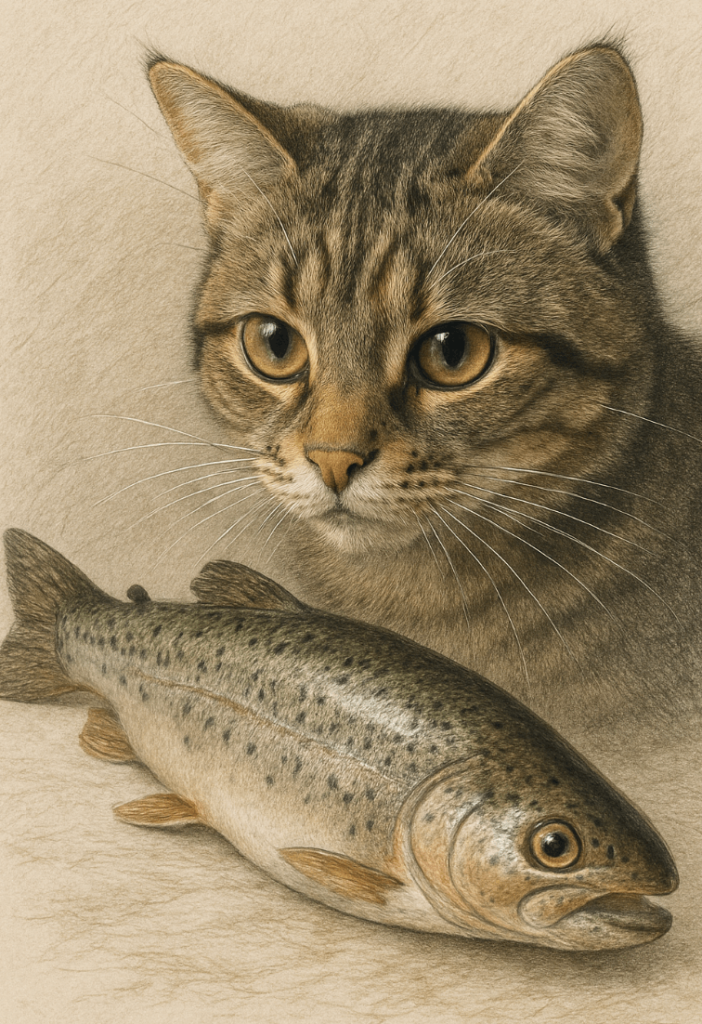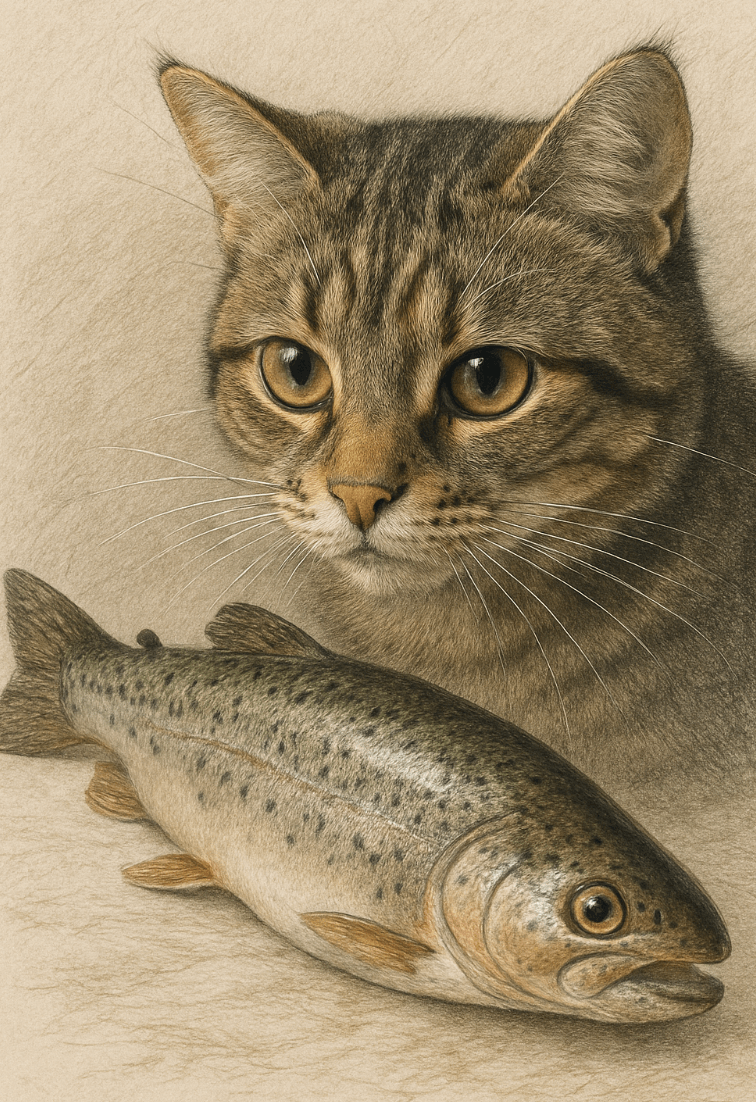Can Cats Eat Trout?
Cats are natural carnivores, and their diet often includes fish as a source of essential nutrients. Among the many types of fish available, trout is a popular choice for its rich flavor and nutritional value. But can cats eat trout safely? While trout can offer health benefits like omega-3 fatty acids and high-quality protein, there are important considerations to keep in mind before adding it to your feline friend’s diet. In this blog post, we’ll explore whether trout is a safe and healthy option for cats, how to prepare it properly, and what precautions to take to ensure your cat stays happy and healthy.
Benefits of Feeding Trout to Cats
Trout can be a nutritious addition to your cat’s diet when prepared correctly. Here are some of the key benefits that make trout a potentially great choice for your feline companion.
Rich in Omega-3 Fatty Acids:
Omega-3s support skin health, reduce inflammation, and promote a shiny coat, making trout an excellent dietary supplement.High-Quality Protein Source:
Cats thrive on protein, and trout provides complete amino acids essential for muscle development and overall vitality.Low in Saturated Fat:
Compared to other proteins, trout is leaner and easier on your cat’s digestive system.Vitamins and Minerals:
Trout contains vitamins like B12 and minerals such as phosphorus, which support energy production and bone health.Hydration Support:
When served slightly moist or mixed with water, trout can help increase your cat’s fluid intake, supporting urinary health.
While these benefits are appealing, moderation and proper preparation are key to ensuring trout remains a safe treat for your cat.
Potential Risks of Feeding Trout to Cats
Although trout offers nutritional advantages, it also comes with potential risks that every cat owner should be aware of. Understanding these dangers will help you make informed decisions about including trout in your cat’s diet.
Bones Can Pose Choking Hazards:
Small bones in trout can splinter and cause choking or internal injuries if not removed carefully.Risk of Parasites:
Raw or undercooked trout may contain parasites like tapeworms, which can infect your cat and lead to health issues.Allergic Reactions:
Some cats may develop allergies to fish, resulting in symptoms like itching, vomiting, or diarrhea.High Mercury Levels:
Certain fish, including trout, can contain trace amounts of mercury, which may harm your cat if consumed frequently.Imbalanced Diet Risk:
Overfeeding trout can upset the balance of nutrients in your cat’s diet, leading to deficiencies or excesses.
These risks highlight why trout should be given sparingly and only as part of a well-rounded diet.
Check this guide 👉Can Cats Eat Watermelon? Best 7 Expert Tips!
Check this guide 👉Can Cats Eat Spinach? Best 7 Expert Tips!
Check this guide 👉Can Cats Eat Gingerbread? Best 7 Expert Tips!

Safe Preparation Tips for Trout | Risks of Improper Preparation |
|---|---|
Remove all bones before serving | Bones can cause choking or internal damage |
Cook thoroughly without seasoning | Raw trout may contain harmful parasites |
Serve in small, bite-sized portions | Overfeeding can lead to nutritional imbalances |
Avoid adding oils, salt, or spices | Seasonings can upset your cat’s stomach |
Consult your vet before introducing trout | Frequent consumption may pose long-term health risks |
How to Safely Prepare Trout for Your Cat
If you decide to feed your cat trout, preparation is crucial to minimize risks and maximize benefits. Follow these steps to ensure your cat enjoys trout safely.
Choose Fresh, High-Quality Trout:
Opt for fresh, wild-caught trout from reputable sources to reduce the risk of contaminants or parasites.Remove All Bones Carefully:
Use tweezers or a fillet knife to extract even the smallest bones, preventing choking hazards.Cook Plain and Unseasoned:
Steam, bake, or boil the trout without adding oils, salt, garlic, onions, or other seasonings that could irritate your cat’s digestive system.Serve in Moderation:
Offer trout as an occasional treat rather than a daily meal to maintain a balanced diet.Monitor for Adverse Reactions:
After feeding trout for the first time, watch for signs of allergies or digestive upset, such as vomiting or diarrhea.
By following these guidelines, you can safely incorporate trout into your cat’s diet while prioritizing their health.
Signs Your Cat May Not Tolerate Trout Well
Even with careful preparation, some cats may not tolerate trout well. Being vigilant for warning signs ensures you address any issues promptly.
Vomiting or Diarrhea:
These symptoms may indicate an intolerance or allergy to trout.Excessive Itching or Hair Loss:
Skin irritation or excessive grooming could signal a food-related allergic reaction.Loss of Appetite:
If your cat refuses to eat after trying trout, they may dislike it or have trouble digesting it.Lethargy or Behavioral Changes:
A sudden lack of energy or unusual behavior might suggest an adverse reaction.Swelling Around the Face or Mouth:
Swelling is a serious sign of an allergic reaction and requires immediate veterinary attention.
Recognizing these signs early allows you to adjust your cat’s diet and seek professional advice if needed.
Common Mistakes to Avoid When Feeding Trout to Cats
Feeding trout to your cat requires care and attention to detail. Avoiding these common mistakes ensures your cat’s safety and enjoyment.
Adding Salt or Spices:
Cats are highly sensitive to seasonings, which can upset their stomach or even be toxic.Serving Large Portions:
Overfeeding trout can unbalance your cat’s diet and lead to weight gain or nutrient deficiencies.Neglecting Bone Removal:
Even small bones can cause serious harm, so always double-check for leftover fragments.Feeding Raw or Undercooked Trout:
Raw fish poses significant health risks, including bacterial infections and parasitic infestations.Ignoring Allergy Symptoms:
Failing to recognize signs of an allergic reaction can delay treatment and worsen your cat’s condition.
Avoiding these pitfalls ensures a safer and healthier experience for your cat.
Alternatives to Trout for Cats
If trout doesn’t suit your cat’s dietary needs or preferences, there are plenty of other fish and protein options to consider.
Salmon (Cooked):
Like trout, salmon is rich in omega-3s but should also be served sparingly and without seasoning.Chicken or Turkey:
Lean poultry is a staple in many commercial cat foods and provides excellent protein.Tuna (in Moderation):
While cats love tuna, it should only be given occasionally due to its high mercury content.Whitefish Varieties:
Cod or haddock are mild, boneless options that are easy to prepare and digest.Commercial Cat Food with Fish:
Many brands offer fish-based formulas that provide balanced nutrition without the hassle of preparation.
These alternatives allow you to cater to your cat’s taste while maintaining a healthy diet.
Understanding Your Cat’s Nutritional Needs
Cats have unique dietary requirements as obligate carnivores, meaning they rely heavily on animal-based proteins. Understanding their nutritional needs helps you make better choices when introducing foods like trout.
Protein Is Essential:
Cats require high levels of animal protein to support muscle growth, tissue repair, and overall energy.Taurine Deficiency Risks:
Unlike dogs, cats cannot produce taurine naturally and must obtain it through their diet, primarily from meat or fish.Hydration Matters:
Cats often don’t drink enough water, so incorporating moisture-rich foods like cooked trout can aid hydration.Fat for Energy:
Healthy fats like those in trout provide concentrated energy and support brain function.Carbohydrates Are Non-Essential:
Unlike humans, cats don’t need carbs and can thrive on low-carb diets focused on protein and fat.
By tailoring your cat’s diet to meet these needs, you ensure they receive the nutrients necessary for optimal health.
Frequently Asked Questions About Cats and Trout
How often can I feed my cat trout?
Trout should only be fed occasionally, no more than once or twice a week, to avoid nutritional imbalances.
Can kittens eat trout?
Kittens have sensitive digestive systems, so it’s best to consult your vet before introducing trout or any new food.
Is raw trout safe for cats?
No, raw trout can contain parasites and bacteria; always cook it thoroughly before serving.
What should I do if my cat has an allergic reaction?
Contact your veterinarian immediately if you notice signs of an allergic reaction, such as swelling or difficulty breathing.
Can trout replace commercial cat food?
No, trout lacks the complete nutrient profile found in commercial cat food and should only supplement, not replace, their regular diet.
Feeding Trout to Your Cat: A Balanced Approach
Trout can be a nutritious and tasty treat for cats when prepared and offered responsibly. Its omega-3 fatty acids, high-quality protein, and other nutrients make it a beneficial addition to your cat’s diet in moderation. However, potential risks like choking hazards, parasites, and allergic reactions mean that caution is essential. By understanding your cat’s individual needs, monitoring their response to new foods, and consulting your veterinarian, you can ensure that trout remains a safe and enjoyable part of their diet. Remember, a happy and healthy cat starts with a well-balanced and thoughtfully planned menu.
Do Cats Have Taste Buds? Best 7 Expert Tips! – Discover how cats experience flavors and why their taste is so unique.
Do Dogs Have Taste Buds? Best 7 Expert Tips! – Discover how dogs experience taste, their preferences, and what it means for their diet and health.
Can Cats Taste Sweet? Best 7 Expert Tips! – Discover why cats can’t taste sweetness, how it affects their diet, and tips to keep them healthy and happy.
Can Dogs Taste Sweet? Best 7 Expert Tips! – Discover how dogs perceive sweetness, which foods are safe, and tips to manage their sweet cravings responsibly.





